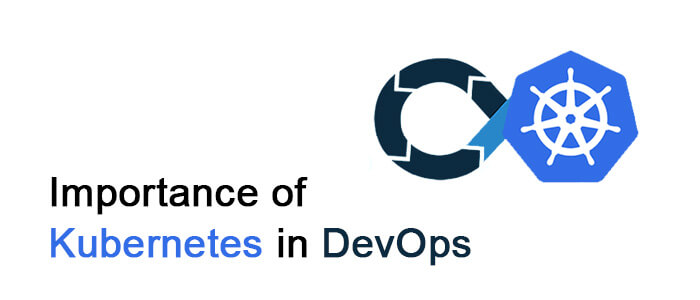Kubernetes and DevOps are a superb combo. Businesses use both of these together because they are a powerful combination. They play a pivotal role in the development of high-end software and applications. But, DevOps and Kubernetes are not related, right? So, how is this integration possible?
Listed below are the reasons to adopt DevOps and Kubernetes for enhancing the efficiency of the operations:

What is DevOps?
Application size, requirements, and complexities are growing bigger and bigger. On the contrary, the 'time to delivery' and software development cycle are getting shorter and shorter. Software companies readily looking for solutions for a simple, more effective process; DevOps comes out as a solution by introducing an agile approach to IT processes.
It intends to unify Java application development by automating tasks and managing configurations, thereby contributing to the software development lifecycle in terms of planning, strategy, building, coding, testing, deploying, launching, and monitoring. But, the real hurdle arises when the applications become more micro and diverse. Here is where containers and Kubernetes come into play.
Containers and Kubernetes
Simply put, a container is a portable environment that simplifies the hosting and managing of the life cycle of web applications. It is designed to deliver efficiency, productivity, and consistency. DevOps and containers are different concepts, however, they are considered together.
Kubernetes, an open-source container orchestration platform is used extensively. It supports a variety of containers to function in combination. In the end, it lessens the operational load. Volume storage, computer resource, rolling deployment, auto-scaling are a few of the top features. It can run in a data center, or a public, private, or hybrid cloud.
Why is Kubernetes important for DevOps?
So now, the question is, how Kubernetes can be helpful to DevOps? It enables the engineers to share their dependencies with the IT operations. One of the topmost reasons for using Kubernetes for DevOps is that it lessens workload. Also, it solves the contradictions amidst different environments. It allows the engineers to respond to the customer requirements while relying on the cloud for a load of functioning apps.
Kubernetes smoothens the container tasks. It eases activities like canary deployment, rolling updates, and horizontal auto-scaling. It plays a major role in streamlining the development, testing as well as deploying pipelines in the DevOps Managed Services.
Kubernetes enhances the quality of the DevOps processes, listed below are a few reasons:
Consistency in the development, testing, and deployment environment
While writing, testing, or deploying an application inside a container, the atmosphere at different delivery parts does not change. It simplifies the collusion between various teams involved in the process, such as developers, admins, and testers. Thus, it allows the team to work in the same environment.
Offers seamless updates
For continuous software delivery, application updates need to be rolled out on a consistent and streamlined basis. It is easy to apply container orchestration. Kubernetes is capable of helping with the updates to the apps. If your application is segregated across multiple Microservice, all of them are deployed in different containers. Therefore, the updates can be performed in one part of the app by restarting the container and not bothering the rest of the application.
Supports multiple frameworks
When the DevOps approach is followed religiously by the containers, they can very easily and swiftly switch between a wide range of deployment frameworks. Container orchestration is a little skeptical towards different languages and platforms, as a result, a wide range of applications can run within the container.
The movement of the containers between various host systems is streamlined as well. For example, if you want to migrate from Ubuntu to Red Hat, you can do it easily with containers.
Effortless scalability
Kubernetes offers a container-based integration ecosystem that is continuous and autonomous. Thus, it provides the capability to scale up or down the application based on requirement and burden. This nature of the environment ensures immediate feedback once you commit to the repository.
Less time is taken to onboard new application
The time taken to complete new projects is lessened with the Kubernetes with DevOps. It can now contain a reusable pipeline and new loads as code modules, which can be distributed crosswise to various projects.
Enhances a developer's productivity and efficiency
Kubernetes enables developers to obtain instant feedback on their builds without waiting in queues. The pipeline offers necessary productivity, efficiency, and convenience that allows developers to define CI configurations apace with code in the same depository.
Helps in handling infrastructural challenges
Manually managing infrastructure operations can be a burdensome task for developers and coding teams as no one will be able to catch a mishappening efficiently. Problems like unanticipated traffic upsurges and power outages can emerge. For such cases, an application that is down can suffer a hefty loss. But, Kubernetes enables you to automate and update patches to overcome such hurdles.
Efficient server usage
Kubernetes with DevOps diminishes the need of overpaying for heavy loads. Whether the app is deployed on the premise or the cloud, the server usage is efficient. It ensures that the load is not over increased or reduced.
Other benefits of Kubernetes with DevOps
- Quick delivery of software with improved compliance
- Facilitates continual enhancement
- Enhances collaboration and transparency across the team(s) that are responsible for delivering the software.
- Effectively reduce development costs and security risks
Challenges with Kubernetes
Although Kubernetes offers a plethora of benefits, there is a challenge that turns the scenario. Kubernetes is complex and hard to set up and use; you will need a highly-skilled resource to manage it. To someone who is not familiar with containers or Kubernetes in particular, the setup might look simple and easy to implement and run.
But in reality, you will require additional functionality such as maintenance, backups, and disaster recovery to make it production-ready. Therefore, if you are contemplating opting for Kubernetes, make sure you have the highly skilled resources to give an edge to your organization.
ALSO READ
Final thoughts
Kubernetes is one of the best picks for ensuring continuous delivery while keeping the process agile. However, an organization must understand how DevOps and the continuous development process helps to enhance the end-user experience.
All in all, Kubernetes has changed the way applications and developed, deployed, and shipped by delivering what matters. However, using Kubernetes is a hassle, and an organization should consider the requirements and challenges while using this platform.
Recent Blogs
Categories



